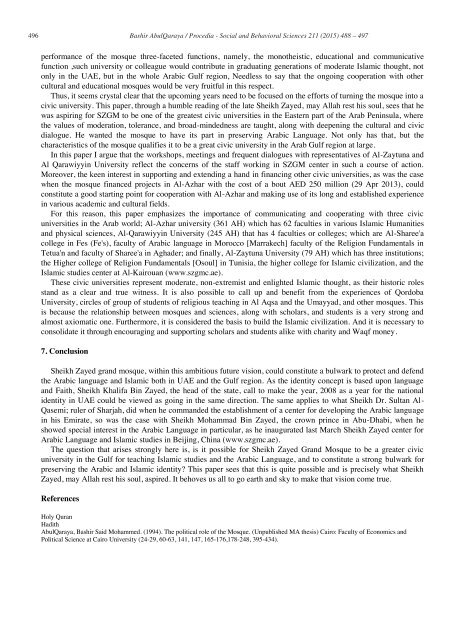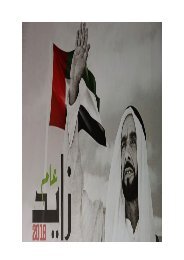1-s2.0-S1877042815054051-main
You also want an ePaper? Increase the reach of your titles
YUMPU automatically turns print PDFs into web optimized ePapers that Google loves.
496 Bashir AbulQaraya / Procedia - Social and Behavioral Sciences 211 ( 2015 ) 488 – 497<br />
performance of the mosque three-faceted functions, namely, the monotheistic, educational and communicative<br />
function ,such university or colleague would contribute in graduating generations of moderate Islamic thought, not<br />
only in the UAE, but in the whole Arabic Gulf region, Needless to say that the ongoing cooperation with other<br />
cultural and educational mosques would be very fruitful in this respect.<br />
Thus, it seems crystal clear that the upcoming years need to be focused on the efforts of turning the mosque into a<br />
civic university. This paper, through a humble reading of the late Sheikh Zayed, may Allah rest his soul, sees that he<br />
was aspiring for SZGM to be one of the greatest civic universities in the Eastern part of the Arab Peninsula, where<br />
the values of moderation, tolerance, and broad-mindedness are taught, along with deepening the cultural and civic<br />
dialogue. He wanted the mosque to have its part in preserving Arabic Language. Not only has that, but the<br />
characteristics of the mosque qualifies it to be a great civic university in the Arab Gulf region at large.<br />
In this paper I argue that the workshops, meetings and frequent dialogues with representatives of Al-Zaytuna and<br />
Al Qarawiyyin University reflect the concerns of the staff working in SZGM center in such a course of action.<br />
Moreover, the keen interest in supporting and extending a hand in financing other civic universities, as was the case<br />
when the mosque financed projects in Al-Azhar with the cost of a bout AED 250 million (29 Apr 2013), could<br />
constitute a good starting point for cooperation with Al-Azhar and making use of its long and established experience<br />
in various academic and cultural fields.<br />
For this reason, this paper emphasizes the importance of communicating and cooperating with three civic<br />
universities in the Arab world; Al-Azhar university (361 AH) which has 62 faculties in various Islamic Humanities<br />
and physical sciences, Al-Qarawiyyin University (245 AH) that has 4 faculties or colleges; which are Al-Sharee'a<br />
college in Fes (Fe's), faculty of Arabic language in Morocco [Marrakech] faculty of the Religion Fundamentals in<br />
Tetua'n and faculty of Sharee'a in Aghader; and finally, Al-Zaytuna University (79 AH) which has three institutions;<br />
the Higher college of Religion Fundamentals [Osoul] in Tunisia, the higher college for Islamic civilization, and the<br />
Islamic studies center at Al-Kairouan (www.szgmc.ae).<br />
These civic universities represent moderate, non-extremist and enlighted Islamic thought, as their historic roles<br />
stand as a clear and true witness. It is also possible to call up and benefit from the experiences of Qordoba<br />
University, circles of group of students of religious teaching in Al Aqsa and the Umayyad, and other mosques. This<br />
is because the relationship between mosques and sciences, along with scholars, and students is a very strong and<br />
almost axiomatic one. Furthermore, it is considered the basis to build the Islamic civilization. And it is necessary to<br />
consolidate it through encouraging and supporting scholars and students alike with charity and Waqf money.<br />
7. Conclusion<br />
Sheikh Zayed grand mosque, within this ambitious future vision, could constitute a bulwark to protect and defend<br />
the Arabic language and Islamic both in UAE and the Gulf region. As the identity concept is based upon language<br />
and Faith, Sheikh Khalifa Bin Zayed, the head of the state, call to make the year, 2008 as a year for the national<br />
identity in UAE could be viewed as going in the same direction. The same applies to what Sheikh Dr. Sultan Al-<br />
Qasemi; ruler of Sharjah, did when he commanded the establishment of a center for developing the Arabic language<br />
in his Emirate, so was the case with Sheikh Mohammad Bin Zayed, the crown prince in Abu-Dhabi, when he<br />
showed special interest in the Arabic Language in particular, as he inaugurated last March Sheikh Zayed center for<br />
Arabic Language and Islamic studies in Beijing, China (www.szgmc.ae).<br />
The question that arises strongly here is, is it possible for Sheikh Zayed Grand Mosque to be a greater civic<br />
university in the Gulf for teaching Islamic studies and the Arabic Language, and to constitute a strong bulwark for<br />
preserving the Arabic and Islamic identity? This paper sees that this is quite possible and is precisely what Sheikh<br />
Zayed, may Allah rest his soul, aspired. It behoves us all to go earth and sky to make that vision come true.<br />
References<br />
Holy Quran<br />
Hadith<br />
AbulQaraya, Bashir Said Mohammed. (1994). The political role of the Mosque. (Unpublished MA thesis) Cairo: Faculty of Economics and<br />
Political Science at Cairo University (24-29, 60-63, 141, 147, 165-176,178-248, 395-434).




